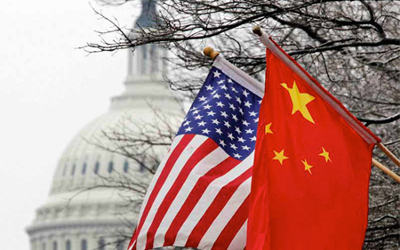AKIPRESS.COM -  President Xi Jinping will demonstrate China's increasing global influence on his first state visit to the United States next week for a closely watched summit with Barack Obama, even as concern builds that its giant economy is losing steam, Digital Journal said.
President Xi Jinping will demonstrate China's increasing global influence on his first state visit to the United States next week for a closely watched summit with Barack Obama, even as concern builds that its giant economy is losing steam, Digital Journal said.
The United States and China, the world's two biggest economies, also have powerful military and their relationship encompasses cooperation and competition on a global scale.
Key topics during the trip signalled by Chinese officials include their trade and business relationship, geopolitics, climate change, terrorism and cybersecurity, among others.
The visit kicks off Tuesday in west coast technology and aviation hub Seattle before Friday's summit in Washington. Xi then heads to New York to mark the 70th anniversary of the United Nations.
China sees the trip as a chance to stress its self-perceived status as the only nation able to rival the US in global importance, with Xi telling U.S. business leaders Thursday of a "new model of major country relations".
The Chinese leader added he was ready to have a "profound exchange of views with President Obama on major issues of mutual concern".
Ruan Zongze, vice president of the China Institute of International Studies, a foreign ministry-affiliated think tank, told diplomats at the Lanting forum in Beijing that the nature of the relationship had changed.
"The world is entering a stage of major adjustments and changes," he said. "Under such circumstances China cannot just remain silent like it was before."
Less than three months ago, Beijing was basking in the limelight of having succeeded in signing up dozens of countries, including close US allies Germany and Britain, to its Asian Infrastructure Investment Bank.
But an extended plunge on the Shanghai stock exchange, along with global market jitters over an ongoing growth slowdown and questions over Xi's and other Communist leaders' economic management skills, have dulled some of the lustre.
Despite the recent economic volatility, Carl Baker, director of programmes at the Honolulu-based Pacific Forum CSIS, told AFP: "He still comes with a fairly strong hand vis-a-vis Obama simply because Obama is becoming a lame duck.
"And Xi Jinping is still pretty sure he's going to be around for some time in the future."
Though craving recognition abroad – and perhaps even more importantly at home – as a great power, China is also aware of suspicions over its actions and regularly seeks to issue verbal reassurances.
That was on parade, literally, earlier this month when Beijing displayed a massive amount of military hardware – including "carrier-killer" anti-ship ballistic missiles – in the capital to mark 70 years since Japan's World War II defeat.
Presiding over the march, Xi took pains to assert that China does "not seek hegemony".
But it is currently locked in territorial disputes with close U.S. allies Japan and the Philippines, making the region the most likely location for a collision between the interests of Beijing and Washington.
Beijing is building artificial islands in disputed waters in the South China Sea, and foreign minister Wang Yi said at a regional summit last month that the works had stopped – only for a Washington think-tank to release satellite pictures this week showing it continuing.
Chinese officials see the summit as an opportunity to tone down worries in the U.S. over its global ambitions and increasing military profile, along with accusations that Beijing has been behind major acts of cyber espionage against the U.S. government and companies.
Xi would be looking to "build trust", Wang told this week's Lanting forum, adding the two countries must "dispel strategic misgiving and avoid strategic miscalculation".
Other governments "will be looking for signals on whether the two countries are competing or cooperating, and whether they will live together in peace or get stuck in friction or even confrontation," he added.
But he stressed that Beijing will never give up its claims to the South China Sea islands.
The U.S.-China backdrop is one of enduring rivalry, with Beijing's concerns exacerbated by Obama's foreign policy "pivot" to Asia.
Washington has a decades-long military presence in the region and longstanding formal alliances and close relationships, rankling some Chinese commentators.
China has been playing "a bigger role in international relations", as urged by the U.S., Ruan said, only to find Washington expressing concern when it did so.
"The crux of the problem lies in the zero-sum mentality in the United States, because a lot of Americans see China as a source of problems as it grows stronger."
